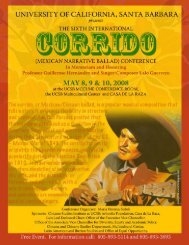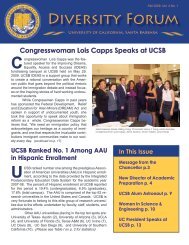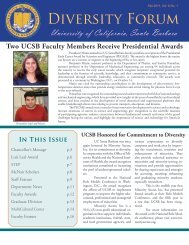Fall 2008 - Diversity, Equity, and Academic Policy - University of ...
Fall 2008 - Diversity, Equity, and Academic Policy - University of ...
Fall 2008 - Diversity, Equity, and Academic Policy - University of ...
Create successful ePaper yourself
Turn your PDF publications into a flip-book with our unique Google optimized e-Paper software.
Departments, Programs, & conferences<br />
New Book!<br />
Footsteps in the<br />
Dark: The Hidden<br />
Histories <strong>of</strong> Popular<br />
Music<br />
by George Lipsitz<br />
George Lipsitz is a Pr<strong>of</strong>essor <strong>of</strong><br />
Black Studies <strong>and</strong> Sociology at<br />
UCSB. In Footsteps in the Dark,<br />
Lipsitz discusses such topics<br />
as the emergence <strong>of</strong> an African<br />
American techno music subculture<br />
in Detroit <strong>and</strong> the prominence<br />
<strong>of</strong> b<strong>and</strong>a, merengue, <strong>and</strong> salsa music<br />
as an expression <strong>of</strong> changing<br />
Mexican, Dominican, <strong>and</strong> Puerto<br />
Rican identities.<br />
Lipsitz analyzes Ken Burns’s<br />
PBS series Jazz as an uncritical<br />
celebration <strong>of</strong> American nationalism<br />
that obscures the civil rights<br />
era’s challenge to racial inequality,<br />
<strong>and</strong> he takes on the infamous<br />
campaigns to censor hip hop <strong>and</strong><br />
the radical black voice in the early<br />
1990’s. Footsteps in the Dark,<br />
shows why, during a time given to<br />
easy answers <strong>and</strong> cliched versions<br />
<strong>of</strong> history, pop songs matter more<br />
than ever.<br />
(Excerpt from book sleeve).<br />
Teatro Chicana:<br />
A Collective Memoir <strong>and</strong> Selected Plays<br />
On Thursday, October 16, <strong>2008</strong> author’s S<strong>and</strong>ra Gutiérrez<br />
<strong>and</strong> Kathy Requejo came to the UCSB Multicultural Center for<br />
a reading <strong>and</strong> discussion <strong>of</strong> their book Teatro Chicana: A Collective<br />
Memoir <strong>and</strong> Selected Plays.<br />
“These memoirs are the personal honest <strong>and</strong><br />
riveting testimonials <strong>of</strong> 17 Chicanas who<br />
performed Chicano theater during the 1970s”.<br />
The 1970s <strong>and</strong> 1980s saw the awakening <strong>of</strong> social awareness<br />
<strong>and</strong> political activism<br />
in Mexican-American<br />
communities. In San<br />
Diego, a group <strong>of</strong> Chicana<br />
women participated<br />
in a political theatre<br />
group whose plays addressed<br />
social, gender,<br />
<strong>and</strong> political issues <strong>of</strong><br />
the working class <strong>and</strong><br />
the Chicano Movement.<br />
Seventeen women who<br />
were a part <strong>of</strong> Teatro<br />
de las Chicanas (later<br />
known as Teatro Laboral<br />
<strong>and</strong> Teatro Raíces)<br />
come together in the<br />
book to share why they<br />
joined the theatre <strong>and</strong><br />
how it transformed their<br />
lives. Teatro Chicana<br />
tells the story <strong>of</strong> this<br />
troupe through chapters<br />
featuring the history <strong>and</strong> present-day story <strong>of</strong> each <strong>of</strong> the main actors<br />
<strong>and</strong> writers, as well as excerpts from the group’s materials <strong>and</strong> seven<br />
<strong>of</strong> their original short scripts.<br />
8






